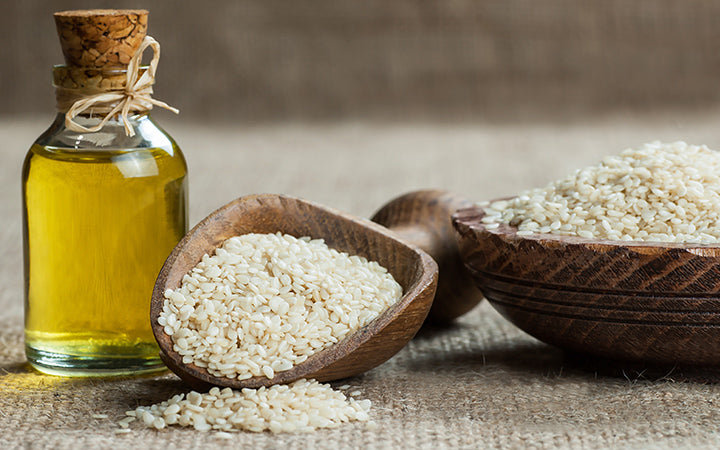Is Sesame Oil Good For Your Skin?
Last Updated on June 18, 2025 by Jaclyn A. Neeley
Sesame oil can be good for your skin due to its deep hydrating and nourishing properties, making it an effective natural moisturizer and anti-aging agent. Sesame oil is a beneficial skincare option for those seeking natural and nourishing solutions.
With its high levels of linoleic acid and vitamin B, sesame oil acts as an all-natural moisturizer, forming a protective barrier to prevent moisture loss and lock in existing moisture. Additionally, its antioxidant, anti-inflammatory, and antibacterial properties contribute to various skincare benefits.
Sesame oil can be used directly on the skin for deep hydration and as a natural makeup remover, providing an effective alternative to regular moisturizers and commercial makeup removers. Whether used alone or mixed with body lotion, sesame oil offers a natural and rejuvenating option for skincare routines.
The Benefits Of Sesame Oil For Skin
Extracting the nourishing benefits of sesame oil for skin brings deep hydration and anti-aging effects. Its antibacterial and anti-inflammatory properties make it a great choice for various skin conditions. Use sesame oil as a natural moisturizer or mix with lotion for a healthy, glowing complexion.
Sesame oil has been used for centuries in traditional medicine and skincare routines due to its numerous benefits for the skin. The rich nutritional content, antioxidant properties, and anti-inflammatory effects of sesame oil make it a versatile and effective skincare remedy. Additionally, its ability to hydrate and moisturize the skin can alleviate various skin conditions. In this article, we will explore the valuable benefits of sesame oil for skin, shedding light on why it’s a popular choice in natural skincare.
Sesame oil is packed with essential nutrients that are beneficial for the skin. It contains a high concentration of vitamin E, an antioxidant that helps protect the skin from free radicals, thereby preventing premature aging. Moreover, sesame oil is rich in vitamin A and B complex, which contribute to skin health and promote a youthful appearance.
The antioxidant properties of sesame oil play a crucial role in maintaining skin health. Sesamol and sesamin, compounds present in sesame oil, act as powerful antioxidants that protect the skin from damage caused by environmental stressors and UV radiation. These properties help in preserving the skin’s elasticity and youthful glow.
Sesame oil possesses anti-inflammatory properties that can soothe and calm the skin. The presence of copper, a vital mineral in sesame oil, assists in reducing inflammation and promoting skin healing. This makes sesame oil an effective natural remedy for various inflammatory skin conditions, such as eczema and psoriasis.
One of the standout benefits of sesame oil is its exceptional ability to hydrate and moisturize the skin. The oil’s emollient properties enable it to penetrate deeply into the skin, providing long-lasting moisture and nourishment. This makes it an ideal choice for individuals with dry or dehydrated skin, as well as those looking to maintain healthy and supple skin.
Sesame oil has been found to be effective in alleviating various skin conditions. Its antibacterial and anti-inflammatory nature makes it beneficial for managing acne, reducing redness and irritation, and promoting overall skin health. Furthermore, the moisturizing and nourishing properties of sesame oil make it suitable for addressing dry skin, rough patches, and even minor skin wounds.
Sesame oil offers an array of benefits for the skin, making it a valuable addition to natural skincare routines. Whether used alone or as an ingredient in skincare products, the nutritional, antioxidant, anti-inflammatory, hydrating, and healing properties of sesame oil contribute to its efficacy in promoting healthy, radiant skin.
Nutritional Content Of Sesame Oil
Sesame oil is not only known for its delicious flavor but also for its numerous skin benefits. Its nutritional content plays a significant role in enhancing skin health.
Essential Fatty Acids
Sesame oil contains a high concentration of essential fatty acids, including omega-3 and omega-6. These fatty acids are crucial for maintaining healthy skin by nourishing and moisturizing it from within. They also help in maintaining the skin’s elasticity and suppleness.
Vitamins And Minerals
Rich in vitamins such as vitamin E and vitamin K, sesame oil provides antioxidant properties that protect the skin from free radical damage. Additionally, the oil boasts a good amount of calcium, iron, and zinc, which promote skin regeneration and repair.
Phytonutrients
The phytonutrients present in sesame oil, particularly phytosterols and phytates, contribute to its anti-inflammatory and skin-soothing properties. These elements help in reducing redness, calming irritation, and maintaining overall skin health.
Antioxidant Properties Of Sesame Oil
Sesame oil is renowned for its potent antioxidant properties, making it an excellent choice for promoting healthy and youthful skin. The antioxidant properties of sesame oil play a crucial role in protecting the skin from environmental stressors and enhancing its overall health and appearance.
Role In Skin Protection
The antioxidant properties of sesame oil play a pivotal role in protecting the skin from damage caused by free radicals. Sesamol, a powerful compound found in sesame oil, helps to neutralize free radicals, thereby safeguarding the skin from oxidative stress and premature aging. This protection can contribute to maintaining a radiant and youthful complexion.
Potential Anti-aging Effects
Sesame oil’s antioxidant properties contribute to its potential anti-aging effects on the skin. By combating the harmful effects of free radicals, sesame oil aids in reducing the appearance of fine lines, wrinkles, and other signs of aging. Its ability to promote collagen production and skin elasticity can help in achieving a smoother and more youthful complexion.
Combatting Free Radicals
By effectively combating free radicals, sesame oil serves as a potent ally in maintaining skin health. The unique composition of antioxidants in sesame oil, including sesamol and vitamin E, aids in protecting the skin’s cellular integrity and minimizing the damaging effects of environmental factors. This, in turn, contributes to a healthier and more resilient skin barrier.
Anti-inflammatory Effects On Skin
Sesame oil is a natural oil with remarkable benefits for the skin, particularly in its anti-inflammatory effects. These properties make it a valuable ingredient in skincare products and DIY home remedies to alleviate various inflammatory skin conditions.
Alleviating Skin Inflammation
Sesame oil contains anti-inflammatory compounds such as sesamol and sesamin that can help reduce inflammation in the skin. When applied topically, the oil penetrates the skin’s layers, targeting the underlying causes of inflammation and providing relief to conditions such as eczema, psoriasis, and acne.
Soothing Irritated Skin
With its emollient properties, sesame oil acts as a natural skin moisturizer and soothes irritated skin. The oil forms a protective barrier that helps to retain moisture, preventing further irritation and promoting the healing of dry, itchy, and sensitive skin.
Balancing Skin’s Natural Functions
When applied to the skin, sesame oil helps to balance the skin’s natural functions. It supports the skin’s barrier function, enhancing its ability to protect against environmental stressors and maintain its optimal moisture levels, leading to healthier, more resilient skin.
Hydration And Moisturization Benefits
When it comes to skincare, the quest for hydration and moisturization benefits is never-ending. Many natural oils boast significant advantages for the skin, and sesame oil is no exception. Its deep skin hydration, nourishing, and softening properties, along with its ability to enhance skin elasticity, make it a valuable addition to your skincare routine.
Deep Skin Hydration
Sesame oil contains a high concentration of fatty acids, particularly linoleic acid, which deeply penetrates the skin’s layers, providing intense hydration. The oil’s lightweight nature allows it to be absorbed quickly, ensuring that the skin receives immediate nourishment and moisture, resulting in a supple and radiant complexion.
Nourishing And Softening Dry Skin
Sesame oil is rich in vitamin E, an antioxidant renowned for its ability to repair and protect the skin. This nutrient facilitates the nourishment and softening of dry, flaky skin, effectively addressing common issues such as rough patches and discomfort. Regular use of sesame oil can contribute to smoother, more healthy-looking skin.
Enhancing Skin Elasticity
By promoting the production of collagen and elastin, sesame oil contributes to enhanced skin elasticity. This helps to maintain the skin’s firmness and suppleness, reducing the appearance of fine lines and wrinkles. Furthermore, the oil’s moisturizing effects aid in preventing the loss of skin elasticity, promoting a youthful and rejuvenated complexion.

Credit: vedix.com
Potential Skin Conditions Alleviated By Sesame Oil
Potential Skin Conditions Alleviated by Sesame Oil
Eczema And Psoriasis
Sesame oil possesses potent anti-inflammatory and healing properties that can provide relief for individuals suffering from eczema and psoriasis. The oil helps soothe irritated skin and reduce the appearance of dry, flaky patches by nourishing the skin with essential nutrients, thereby promoting skin regeneration.
Acne-prone Skin
Individuals with acne-prone skin can benefit from using sesame oil due to its antimicrobial and antibacterial properties. Sesamol, an active compound in sesame oil, helps to inhibit the growth of acne-causing bacteria and reduce inflammation, aiding in the control of breakouts.
Sunburn Relief
Sesame oil is an effective natural remedy for sunburn relief. It can help soothe and hydrate the skin, reducing redness and irritation caused by UV exposure. Additionally, its antioxidant properties may assist in repairing sun-damaged skin and preventing peeling.
Frequently Asked Questions For Is Sesame Oil Good For Your Skin?
Can Sesame Oil Be Used On Face?
Yes, sesame oil can be used on the face for deep hydration and nourishment. It can also be mixed with body lotion or used directly on the skin for moisturizing and anti-aging benefits. Additionally, it can be used as a natural makeup remover.
Which Is Better For Skin Sesame Oil Or Olive Oil?
Sesame oil has antibacterial and anti-inflammatory properties, making it beneficial for various skin conditions. It penetrates the skin easily, moisturizing and nurturing it, while olive oil can be used as a natural makeup remover or treatment for dry lips. Both have their own unique benefits.
Is Coconut Oil Or Sesame Oil Better For Skin?
Sesame oil is great for skin due to its moisturizing, anti-inflammatory, and antibacterial properties. It easily penetrates the skin, providing deep hydration and nourishment. Coconut oil is also good for skin and hair care, known for its moisturizing effects. Both oils offer different benefits for the skin.
Who Should Not Use Sesame Oil?
Avoid sesame oil if you’re on medications for high blood pressure or diabetes. It may cause your levels to drop too low. Always consult your doctor before adding sesame oil to your diet.
Is Sesame Oil Good For Skin Hydration?
Sesame oil is rich in antioxidants and essential fatty acids, making it an excellent natural moisturizer for the skin. It helps in maintaining hydration and nourishing the skin, leaving it soft and supple.
Conclusion
Incorporating sesame oil into your skincare routine can lead to amazing benefits for your skin. Its moisturizing and antibacterial properties make it an effective natural remedy for various skin conditions. Whether as a deep moisturizer, anti-aging treatment, or natural makeup remover, sesame oil is a versatile and beneficial addition to your beauty regimen.







